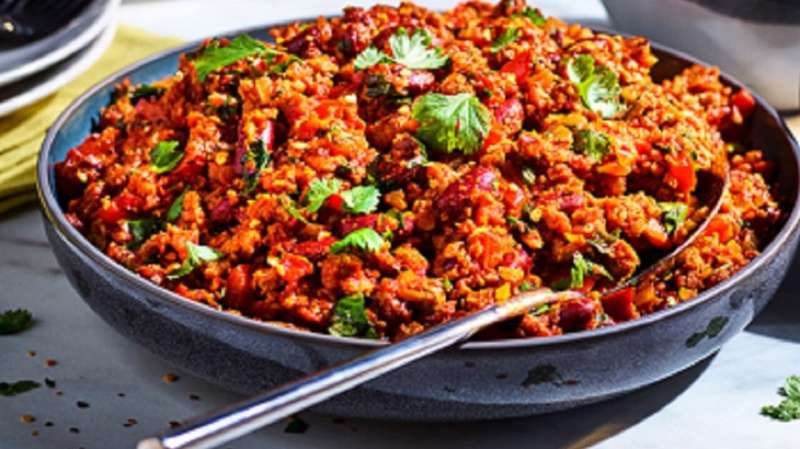This article has been reviewed according to Science X's editorial process and policies. Editors have highlighted the following attributes while ensuring the content's credibility:
fact-checked
peer-reviewed publication
trusted source
proofread
Swapping meat for 'mycoprotein' may protect against bowel cancer

Researchers from Northumbria University have found that swapping red and processed meat for Quorn's "mycoprotein," a fungi-based meat alternative, leads to a significant reduction in intestinal genotoxins—which can cause bowel cancer—and increases healthy gut bacteria.
Their study, published in the European Journal of Nutrition, explored for the first time the effects of replacing a high red and processed meat intake with mycoprotein on the levels of cancer causing chemicals, known as genotoxins, found in the intestines, as well as the impact on gut health.
The randomized clinical trial followed 20 healthy male adults aged 18-50 and was split into two distinct phases. The meat phase saw trialists consume 240g of red and processed meat—including beef steak, pork sausages and ham slices—each day for a two-week period. For the mycoprotein phase, they consumed the same weight in fungi-derived mycoprotein equivalents over a separate two-week period, with a "washout" period of four weeks between the two phases.
Analysis of stool and urine samples from the mycoprotein phase revealed that levels of detected genotoxins like nitroso compounds (NOC) and p-cresol—chemical contaminants that have been found to be potential cancer risk markers—were significantly reduced. Conversely, results from the meat phase showed that genotoxin levels had risen, potentially increasing the long-term risk of bowel cancer, which is also known as colorectal cancer. The difference between the meat and mycoprotein phases was statistically significant.
As well as delivering significant reductions in harmful genotoxins, the mycoprotein diet was also found to significantly improve gut health, increasing the abundance of protective bacteria such as Lactobacilli, Roseburia, and Akkermansia, which are associated with offering protection against chemically induced tumors, inflammation and bowel cancer.
In contrast, findings from the meat phase revealed an increase in gut bacteria linked with issues such as cancer, cardiovascular diseases, weight gain and other negative health outcomes.
Epidemiological data consistently associates red and processed meat with an increased risk of bowel cancer, leading to recommendations from both EATLancet and the International Agency for Research on Cancer (IARC) to reduce meat consumption.
Commenting on the findings, lead researcher Dr. Daniel Commane, Associate Professor in Nutritional Sciences at Northumbria University, said, "Bowel cancer is the fourth most common cancer in the UK, with more than 40,000 new cases each year, and data consistently associates red and processed meat consumption with increasing people's risk."
"As previous studies had identified that reasons for this enhanced risk include the fact that meat increases genotoxicity and, potentially, reduces fiber intake due to it commonly displacing plant foods, we wanted to explore the impact of switching meat for the fungi-based mycoprotein when it came to bowel cancer risk."
"The study showed that this dietary change delivers a significant reduction in genotoxicity and an increase in beneficial gut microbes. Our findings suggest therefore that this high-fiber protein source provides a good alternative to meat in the context of gut health and could help to reduce long-term bowel cancer risk."
The trial was investigator blind, meaning the researchers did not know which group had which diet, and participants were screened for any gastrointestinal diseases or use of medication that might affect their gut/intestine, along with other conditions like coronary artery disease and diabetes. Participants were also asked to avoid consuming any other meat or Quorn mycoprotein products other than the supplied study foods, as well as any additional high protein, fiber or probiotic supplements, during the trial.
Tim Finnigan, Scientific Advisor for Quorn Foods, said, "This latest study adds to the growing body of evidence that the nutritious protein source that is mycoprotein offers substantial health benefits, protecting against a range of diseases and conditions."
"With official dietary advice encouraging everyone to consume less meat to improve the health of people and our planet, alternatives such as Quorn's mycoprotein, which has an excellent nutrition profile, being high in protein and fiber, low in saturated fat and free from trans-fat and cholesterol, is really important. While many meat alternatives are plant-based, mycoprotein is fungi-based which, emerging evidence suggests, brings a range of additional benefits to metabolic health."
Academics from Northumbria's Nutrition and Food Research Group are continuing to investigate the impact of mycoprotein on gut health. In particular, they are interested in understanding how the gut uses fibers in mycoprotein, such as chitin, beta glucan and mannan, and whether they might help train our immune systems or aid in lowering cholesterol levels, for example. The research team also said that further studies are needed to look at the impact of mycoprotein on gut health in different participant groups, disease or health states, and with other gut health outcomes.
This study is the latest to demonstrate how Quorn's mycoprotein delivers significant health benefits, including appetite regulation for those with obesity and type 2 diabetes, muscle growth and reducing cholesterol levels.
More information: Dominic N. Farsi et al, Substituting meat for mycoprotein reduces genotoxicity and increases the abundance of beneficial microbes in the gut: Mycomeat, a randomised crossover control trial, European Journal of Nutrition (2023). DOI: 10.1007/s00394-023-03088-x





















